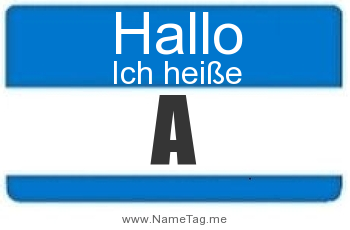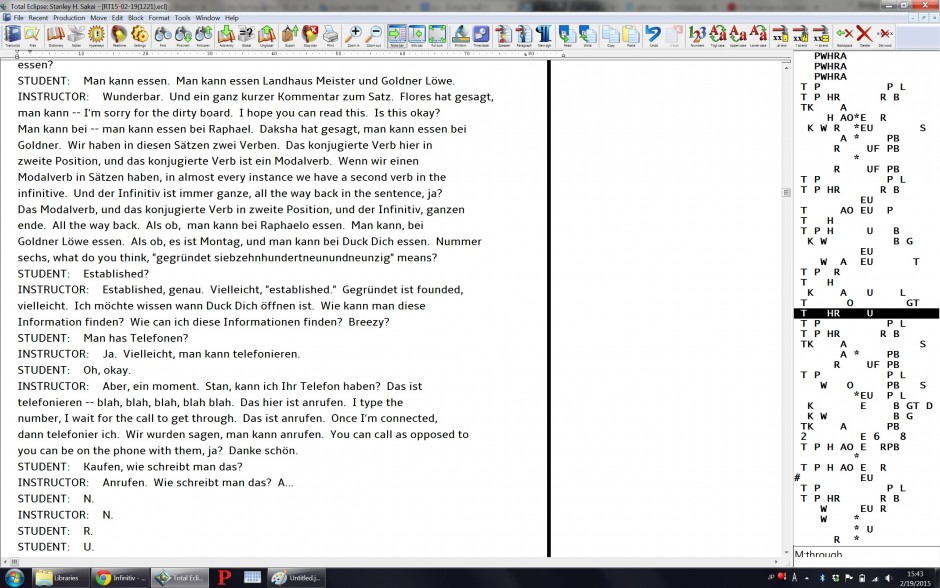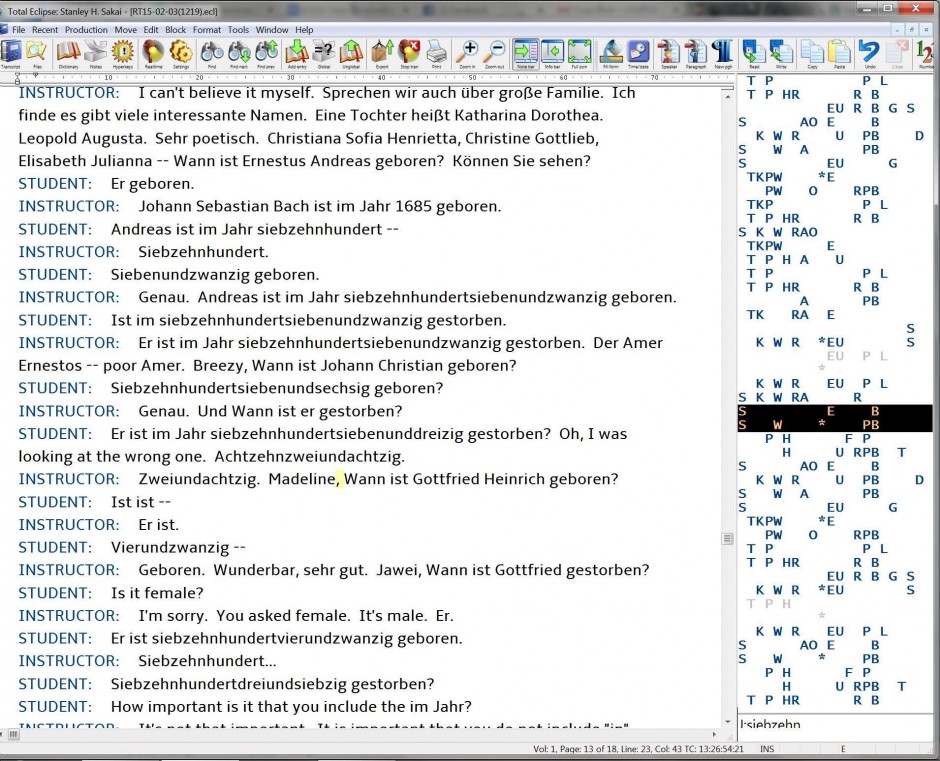Hey, everybody! So due to popular request, I just uploaded a new vlog post today demoing my Spanish steno! Check it out!
Category: i18n
A Different Kind of Steno Hell: German
If you’ve missed the blatantly self-promotional vomit I’ve been unabashedly spewing all over Jade’s Stenoquery and on my own social media pages, you might not have known that I have accepted quite the unique challenge this semester: Captioning a semester-long intensive German class. I feel like I can barely manage to pull my head out of my ass when writing English realtime, but GERMAN?! HOW DO YOU EVEN? Besides not speaking the language at all prior to starting the class, stenoing a language class as opposed to a monolingual foreign language environment presents a number of unique problems that compound on the scads of details that we stenos are constantly juggling with in our heads whilst taking down just one language.
Let me explain why this situation is, without exaggeration, a venerable shitshow.

1. Language classes are bilingual environments.
You’re dealing with two sets of vocabularies and trying to prevent their corresponding dictionaries from overlapping because you constantly need access to the entirety of each at all times. You might be tempted to assign EUBG for “ich” but that’s your -ic. Sie and sie? Well, SAOE is “see” and SAO*E is “sea.” ES can’t be “es” because ES is “he is.” TKU can’t be “du” because it’s “did you.” The list goes on and on. How the hell do you brief anything? If you’re a brief heavy writer like I am, pretty much all simple strokes are used up, including those containing the asterisk. What is one to do? I guess I don’t have that many strokes containing the number bar.
Solution: NUMBER BAR IT IS. Thus, ich = #EU, ich bin = #EUB, du = #2KU, sie = #150E, Sie = #150*E, etc. Thankfully if it’s multistroke, the German entry will seldom conflict with an English entry so for those you can just write them normally. TKPWE/SEUBGT for Gesicht won’t really conflict with anything in English. Nor will PHAOURT/HREURBG/SAOEUTS for mütterlicherseits.
Sometimes, I just define the English outline for certain words that look enough like English and mean the same thing in German, which, consequently means that while I’m writing, random German words sometimes pop up. But since they look enough like their English counterparts, I don’t worry about it being confusing. It just looks kinda ugly having English text with random capitalized nouns and German here and there: “I have a nice Präsentation for you today. But before that, kann you all turn in your completed Handouts?” But you can only do so much, ja?
2. Special characters.
It’s logical to expect heavy reliance on fingerspelling in a foreign language class but what if the word contains a vowel with an umlaut or the eszett (ß)? These letters make important morphological distinctions in German. “Bruder” is just one brother but “Brüder” is plural. Es gibt hier ein Apfel aber ich kann noch drei Äpfel in meiner Tasche haben (There is an apple here but I can have three more apples in my bag). You can’t just stick in the non-umlauted version because many words differentiate themselves solely by the presence of the two dots.
Solution: Make additional fingerspelling letters using some random ass combination of letters. I chose STK* for no reason at all. Thus, STKA* = ä, STKO* = ö, STK*E = ë, STK*U = ü, STK*S = ß, STKO*EU = äu.
3. German phonology doesn’t necessarily map neatly to what we have available on the American steno keyboard.
There are many ways in which German does not “fit” on the English-derived steno keyboard.
- German has more vowels than English and many words are minimal pairs based on a vowel sound alone. Bruder/Brüder, schon/schön only differ by the raised vowel but some differ by a vowel and maybe something else attached to the end: Zahn/Zähne, Satz/Sätze. English steno theories do not have ways to handle these.
Solution: Reassign English steno combos to German values. Thus, AOU -> ü (Bruder = PWRURD, Brüder = PWRAOURD). AE -> ä (Satz = SATS, Sätze = SAETS). OE -> ö (schon = SHOPB, schön = SHOEPB).
- German contains certain consonant combos that don’t exist in English: schreiben, schlappen schneit, schwarz.
Solution: Again, make some shit up. SKHR- = schr-/schl-, SKPH- = schn-, SW- = schw-. Thus, SKHRAOEUB = schreib-, SKHRAP = schlap-, SKHRAF = schlaf, SKPHAOEUT = schneit, SWARZ = schwarz.
*I haven’t yet found an instance where having both schr- and schl- represented as SKHR- would create conflict.
- German morphemes don’t look like English ones, which makes tucking endings and such impossible using conventional English steno theory (The most common endings are not -ing, -ed, and -s/es so you can’t just throw those in intuitively for inflected forms). This fact makes writing German on an English steno machine incredibly sucky because PRACTICALLY EVERYFUCKINGTHING in German has mutable endings or vowels carrying fake IDs.

So how do you avoid having to come back for every damn inflection of a word?
Solution: Assign new values to final consonants that would serve as tucked endings in English. -DZ = -en, -Z = -e, -SZ = -es, -T = -t, *S = –st. Why -Z for -e? Jacked that shit straight from German steno. Thus, HABDZ = hab + en -> haben. SAGDZ = sag + en -> sagen. TRAGZ = trage. TKPWHRAUBZ = glaube. TKPWHRAUBDZ = glauben. If -Z doesn’t “fit” when adding -e, throw in * instead. So dachte becomes TKA*BGT, brachte becomes PWRA*BGT because you can’t fit BGT and -Z in the same stroke, obvs.
But you can have fun with this like in English. Make up a bunch of arbitrary shit that adds endings or phrases if it’s included in a stroke. Like, I’ve made the -Z into an x + Sie phrase ender. So haben Sie becomes HAEBZ, stehen Sie becomes STA*EUPBZ, können Sie becomes KO*EPBZ. -FB and -FT add the accompanying conjugations of haben in certain phrases. Ich habe -> EUFB, wir haben -> WEUFB, sie hat, er hat -> SWRAOEFT, EFT.
- Condensing syllables.
The reason there’s an asterisk in stehen Sie and können Sie in the above examples of phrasing is because it means I’ve “skipped” a syllable. So, like, kön-nen is KÖN and ste-hen (which is pronounced more like “shtay-hun”) is STAIN. I don’t really have a nice, concise system yet but for now I use * sometimes to condense two syllables, one of which contains a stressed syllable followed by an unstressed schwa-sounding one.
Stehen -> STA*EUPB, können -> KO*EPB, sehen -> SA*EUPB, gehen -> TKPWA*EUPB.
3. Capitalization.
German capitalizes all nouns. Ein Gewitter is “a thunderstorm” while es gewittert means “it is thunderstorming.” Sometimes a noun and a verb stem look the same. Sie fragen means “you ask” but haben Sie Fragen? means “do you have questions?” So every time I write TPRAG, which I’ve defined as “frag-,” I have to take a split second to ask myself whether in this context, it is a noun or a verb to decide if I should hit KPA (cap next) right before.
Say a normally capitalized noun is combined into some compound — yeah, it’s no longer capitalized if it’s not the first word in said compound. “The restaurant” should be written das Restaurant but if you want to say “my favorite restaurant is,” it takes on the prefix Lieblings-. Hence, mein Lieblingsrestaurant ist would be the German equivalent.
This becomes a problem if, say, you’ve made a handy prefix HRAOEBLS for Lieblings-. Eclipse doesn’t have a “force next word to lowercase” command so if you just write having defined RAURPBT as “Restaurant,” you get LieblingsRestaurant — wrong.
Solution: Define everything that’s a compound. Fingerspell like a mothafucka. Define certain things that are commonly said as non-nouns lowercase, that way you can just throw your cap next stroke in before it to make it look right. But the trick is remembering to every-goddamn-time.

4. Not knowing the language.
Most anglophone stenos will tell you (usually with a characteristic balls-out, no-shame, pedantic/elitist/prescriptivist flair — note to U.S. court reporters: Please stop) how crucial having a vast vocabulary is when taking down English speech. Well, lucky you because your English is pretty on point, yeah? Too bad it means koala shit in this context. Of course there will be certain frequently used words and phrases that overlap with English (Think: Schadenfreude, Zeitgeist, gesundheit, etc.), but for the most part, German phonology and syntax differ enough that having an exquisitely developed ear for English will help nichts bis sehr wenig when writing German steno, or any other language steno for that matter.
I have a fairly extensive linguistic background. I graduated from UW with a degree in Linguistics, speak three languages fluently, and have studied four others to varying degrees but German is not one of them. I speak intermediate level Dutch, which I’ve come to learn, resembles German a great deal more than English. It may sound like I’m bragging but all of this, surprisingly, makes little difference. It’s still hard af. For all intents and purposes, I’m as much a beginner as most of the other students in class. The class is mostly taught in German. While the other students can sit there clueless when the teacher says something unfamiliar, I have to get something down. While the others can use class time to practice new words and phrases, I have to have them mastered by the very next time the teacher utters them. I have to constantly draw upon my linguistic knowledge and combine it with what I can infer based on my cute repertoire of German to approximate spellings for the relentless barrage of words I’ve never heard before. I feel constantly under pressure to stay 10 steps ahead everyone else through intense self-study and/or keeping my phone unlocked with Google Translate up at all times.

One of the ways being a learner has become most painfully apparent is when attempting to accurately transcribe German declensions. If you don’t know what declension (also known as “cases”) is, it’s basically a way certain languages handle grammatical roles in sentences. While analytic languages like English or Chinese rely heavily on word order to convey who does what to whom in a sentence whilst leaving most of the superficial aspects of the words alone (their sound and spelling). Synthetic languages like German tend to do this by forcing you to solve a timed Rubik’s cube every time you hit a noun. Run out of time? Congratulations, you sound like an idiot. English has remnants of a more case-heavy past in the form of subject vs. object pronoun pairs: He/him, she/her, I/me. Well, German has three genders, two numbers, and four cases. So at minimum, an article will generally have 16 forms. Some look the same superficially but serve different functions. The masculine nominative der (the) is the same as the genitive plural — der! It makes word order relatively free compared to English but the drawback is that trying to compose a simple phrase in German is bit like attempting to haul all 20 of your rabid feral cats in a red wagon across a busy intersection.

Sie trägt den Pullover
- SWRAOE/TRAEGT/TKEPB/PHROUFR
- She is wearing the sweater.
Der Pullover ist grün
- TKER/PHROUFR/KWR*EUS/TKPWRAOUPB
- The sweater is green.
Ich habe einen Hund in meinem Haus
- EUFB/OEUPBD/HUPBD/TPH/PHOEUPL/HAUS **maybe make TPH*PLD in meinem??
- I have a dog in my house.
Mein Hund ist im (in + den = im) Haus
- PHOEUPB/HUPBD/KWR*EUS/KWREUPL/HAUS
- My dog is in the house.
Das ist ein Haus
- TKAS/OEUPB/HAUS
- That is a house.
Wofür interessieren Sie sich?
- WAOUFR/SPW*/SAOERPB/SWRAO*E/SEUFP
- What are you interested in?
Woher kommst du?
- WOER/KO*PLTS/#2KU
- Where are you from?
Ich komme aus Seattle.
- #EU/KPHA*US/SAOELGTS **Notice I phrased komme aus as KPHA*US. The * is supposed to stand for the -e in komme.
- I come from Seattle.
The bolded portions of the above examples are to point out the various forms words like “the,” “a/an,” “my,” and “you” take in German. The last example is to illustrate how I applied both phrasing and inflectional principles into a single stroke.
On top of that, Germanic languages tend to stress the first syllable so a lot of times, unless a phrase is uttered very carefully, it’s hard to tell the difference between eine, einer, einen, einem, deine, deiner, deinem, kein, keine, keiner, keinen, keinem because the first syllable gets the stress and the rest goes straight to schwablivion.
Q. So what does all this amount to?


A. Some ridiculous fucking crazy shit.
The end. Tschüss (STAOUS)!
